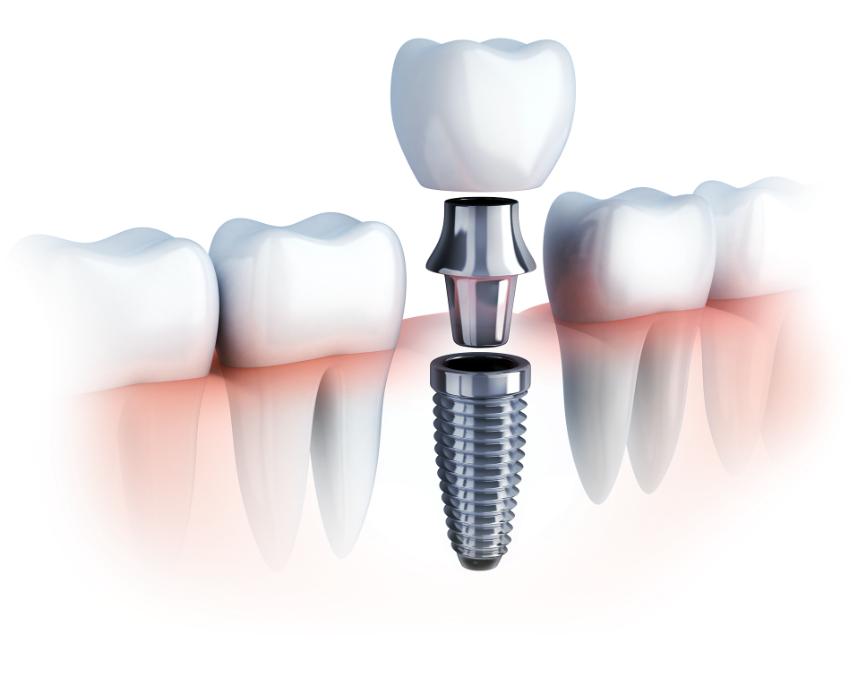The Facts About Dental Sense Uncovered
The Facts About Dental Sense Uncovered
Blog Article
Dental Sense Can Be Fun For Anyone
Table of ContentsThe 45-Second Trick For Dental SenseSome Known Facts About Dental Sense.The smart Trick of Dental Sense That Nobody is DiscussingDental Sense Can Be Fun For Anyone
are clinical tools operatively implanted right into the jaw to bring back an individual's ability to eat or their appearance. They offer support for synthetic (fake) teeth, such as crowns, bridges, or dentures. When a tooth is shed due to injury or illness, an individual can experience difficulties such as rapid bone loss, faulty speech, or modifications to eating patterns that result in pain.Dental dental implant systems contain an oral implant body and dental implant joint and might additionally consist of a joint addiction screw. Front tooth filling. The oral implant body is operatively inserted in the jawbone instead of the tooth's origin. The oral implant joint is normally attached to the implant body by the joint fixation screw and expands via gums into the mouth to sustain the affixed fabricated teeth
(https://dentalsense1.start.page)Structure of The Dental Implant System picking dental implants, speak with your oral supplier concerning the prospective advantages and threats, and whether you are a candidate for the procedure. Points to consider: Your total health and wellness is an essential variable in figuring out whether you are a good prospect for dental implants, the length of time it will certainly require to heal, and how much time the dental implant may remain in location.
Smoking cigarettes may influence the healing procedure and lower the lasting success of the dental implant. The recovery process for the implant body might take a number of months or longer, during which time you generally have a short-term joint instead of the tooth. the dental implant procedure: Thoroughly follow the dental hygiene directions provided to you by your oral supplier.
How Dental Sense can Save You Time, Stress, and Money.
Implant failing can lead to the need for one more surgery to repair or change the dental implant system. Brings back the ability to chew Recovers aesthetic look Aids keep the jawbone from diminishing because of bone loss Maintains the health and wellness of the surrounding bone and gum tissues Helps keep surrounding (neighboring) teeth stable Improves lifestyle Damage to bordering natural teeth during dental implant positioning Injury to the surrounding cells throughout surgery, such as sinus opening Injury during surgical treatment (for example, crack of bordering jawbone) Poor feature, such as feeling like the teeth do not bite with each other normally A feeling that the tooth is loosened or twisting in place arising from an abutment screw loosening up Implant body failure (looseness of the dental implant body) as a result of systemic infection, which might be more likely in clients with uncontrolled diabetes as a result of neighborhood infection in bone and gum tissues supporting the dental implant body because of postponed healing, which may be most likely in individuals that smoke Trouble cleansing the gums around the dental implant, resulting in inadequate dental health Untreated periodontal condition Post-surgical pins and needles due to nerve impingement or damage Constantly inform health and wellness care suppliers and imaging service technicians that you have oral implants before any magnetic vibration imaging (MRI) or x-ray procedures.
FDA is not conscious of any kind of adverse events reported for MRI or x-ray procedures with oral implants. Dental implants systems are generally made from materials that follow worldwide consensus standards of the International Organization for Standardization (ISO) or ASTM International. These criteria have details of what makes a secure material.

An oral implant is a structure that replaces a missing tooth. With screw-like gadgets, the surgeon inserts a dental implant right into the jawbone, and it acts as a support for a synthetic tooth, called a crown.
The smart Trick of Dental Sense That Nobody is Talking About
Some individuals are not qualified for dental implant surgical procedure. It is for oral doctors to operate on people with: intense illnessuncontrollable metabolic diseasebone or soft tissue condition or infectionIf these click to investigate problems are fixed, a person can have the surgical procedure. In, oral doctors avoid operating individuals with: If individuals with any of the above undergo dental implant surgery, there is a greater risk of the implant failing.

Oral dental implant surgical treatment is a tailored procedure. It's not the same for everybody. However the following offers a general summary of what you can anticipate your dental practitioner, dental specialist, periodontist or prosthodontist to do: Place the dental implant operatively. Offer you time to recover. Attach the message and final crown, bridge or denture.
Next off, your doctor will carefully put the dental implant into your jaw. Your doctor will certainly rearrange your gum tissues and close the incision with stitches. If your dental implant is near the front of your mouth, your dental practitioner will make a short-term tooth for you to put on until you recover. That means, you won't have a gap in your smile while you recuperate.
Dental Sense Can Be Fun For Anyone
Throughout the recovery phase, your jawbone needs to fuse to the dental implant. This procedure can take anywhere from 3 to 9 months.
When your implant heals, your dentist can attach the joint (small adapter post) and your last restoration (crown, bridge or denture). This typically takes about one hour to finish and may call for a second minor surgical procedure. You shouldn't really feel any pain during your oral implant procedure due to the fact that your supplier will make use of medicine to numb your gums.
Report this page